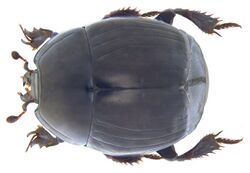Biology:Histeroidea
| Histeroidea | |
|---|---|

| |
| Hister unicolor | |
| Scientific classification | |
| Kingdom: | Animalia |
| Phylum: | Arthropoda |
| Class: | Insecta |
| Order: | Coleoptera |
| Suborder: | Polyphaga |
| Infraorder: | Staphyliniformia |
| Superfamily: | Histeroidea Gyllenhaal, 1808 |
| Families | |
Histeroidea is a superfamily of beetles in the infraorder Staphyliniformia.
Characteristics
Characteristic to Histeroidea are an accessory posterior ridge (locking device) behind the hind margin and presence of medial loop and apical hinge of wing. The elytra are truncate with 1 or 2 abdominal segments visible. The abdominal 8th segment is completely invaginated in the 7th segment. Each antenna has 8 (seldom 7) segments preceding a club of fused segments. The ventral body surface is glabrous.[1]
Ecology
Histeroids in general are predators. However, Sphaeritidae is believed to only be predatory in the larval stage, with its adults being saprophagous instead.[2]
This superfamily occurs in various habitats. The Histeridae alone can be found in dung, carrion, fungi, leaf litter, in symbiosis with other animals (e.g. social insects), under tree bark or in galleries of wood-boring beetles.[2]
Systematics
Some authors treat Histeroidea as a single family within the superfamily Hydrophiloidea (Hydrophiloidea sensu lato), as they seem to form a clade.[3] Three extant families are currently recognized:
- Histeridae (3900+ species)
- Sphaeritidae (7 species)
- Synteliidae (9 species)
Sphaeritidae and Synteiidae each contain just a single genus: Sphaerites and Syntelia, respectively. This makes both families monotypic.
The oldest fossils of the family are Cretohister and Antigracilus from the Early Cretaceous (Aptian) Yixian Formation of China, which are more closely related to Histeridae than the other two families.[4][5]
References
- ↑ Hansen, M. Phylogeny and classification of the staphyliniform beetle families (Coleoptera). Biologiske Skrifter, Copenhagen, 1997
- ↑ 2.0 2.1 Caterino, Michael S.; Vogler, Alfried P. (2002). "The phylogeny of the Histeroidea (Coleoptera: Staphyliniformia)" (in en). Cladistics 18 (4): 394–415. doi:10.1111/j.1096-0031.2002.tb00158.x. ISSN 0748-3007. PMID 34911218. https://onlinelibrary.wiley.com/doi/10.1111/j.1096-0031.2002.tb00158.x.
- ↑ Beutel, Rolf G.; Leschen, Richard A. B. (October 2005). "Phylogenetic analysis of Staphyliniformia (Coleoptera) based on characters of larvae and adults" (in en). Systematic Entomology 30 (4): 510–548. doi:10.1111/j.1365-3113.2005.00293.x. https://onlinelibrary.wiley.com/doi/10.1111/j.1365-3113.2005.00293.x.
- ↑ Zhou, Yu-Lingzi; Caterino, Michael S.; Ślipiński, Adam; Cai, Chen-Yang (October 2018). "Cretohisteridae, a new beetle family from the Early Cretaceous of China, and its implications for the early evolution of the basal group of Histeroidea (Coleoptera): Cretohisteridae and early evolution of Histeroidea" (in en). Systematic Entomology 43 (4): 716–728. doi:10.1111/syen.12300. https://onlinelibrary.wiley.com/doi/10.1111/syen.12300.
- ↑ Zhou, Yu‐Lingzi; Caterino, Michael S.; Ren, Dong; Ślipiński, Adam (October 2020). "Phylogeny and evolution of Mesozoic and extant lineages of Histeridae (Coleoptera), with discovery of a new subfamily Antigracilinae from the Lower Cretaceous" (in en). Cladistics 36 (5): 521–539. doi:10.1111/cla.12418. ISSN 0748-3007. PMID 34618954. https://onlinelibrary.wiley.com/doi/10.1111/cla.12418.
External links
Wikidata ☰ Q1189325 entry
 |
